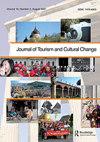Borrowed production: spatial processes of urban waterfront tourism in Guangzhou
IF 2.5
4区 管理学
Q2 HOSPITALITY, LEISURE, SPORT & TOURISM
引用次数: 2
Abstract
ABSTRACT Urban waterfronts are time-space constructions encompassing various social relationships and functions. They become tourism spaces in the context of particular interactions among multiple stakeholders, including local governments and tourism enterprises. Yet the processes for and approaches to transforming urban waterfronts into tourism spaces remain under-researched. Based on the lens of Lefebvre’s space production theory, this research explores how tourism spaces are generated in the waterfront area of Pearl River in Guangzhou that originally featured no tourism attributes. The city government has conceived the shifting representations of space for the Pearl River waterfront over time including commercial space, scenery space, and a showcase of a prosperous city image, but neglected tourism development. Cruise companies are the key entity facilitating the spatial processes of the Pearl River Tour. The approach to space production presents itself as a means of ‘borrowed production,’ where cruise companies produce tourism spaces by embedding themselves into government plans and flexibly utilizing public projects that significantly improve waterfront infrastructure and views. This study contributes to the literature on tourism space production by clarifying the negotiating relationship between urban politics and tourism enterprises.借用生产:广州城市滨水旅游的空间过程
摘要城市滨水区是一种时空结构,包含着各种社会关系和功能。在包括地方政府和旅游企业在内的多个利益相关者之间的特殊互动背景下,它们成为旅游空间。然而,将城市海滨转变为旅游空间的过程和方法仍有待研究。本研究以列斐伏尔的空间生产理论为视角,探讨了广州珠江滨水区原本没有旅游属性的旅游空间是如何产生的。随着时间的推移,市政府设想了珠江滨水空间的变化,包括商业空间、风景空间和繁荣城市形象的展示,但忽视了旅游业的发展。邮轮公司是推动珠江之旅空间进程的关键实体。太空生产的方法表现为一种“借来的生产”方式,邮轮公司通过将自己融入政府计划并灵活利用公共项目来生产旅游空间,从而显著改善滨水基础设施和景观。本研究通过阐明城市政治与旅游企业之间的谈判关系,为旅游空间生产的文献研究做出了贡献。
本文章由计算机程序翻译,如有差异,请以英文原文为准。
求助全文
约1分钟内获得全文
求助全文
来源期刊

Journal of Tourism and Cultural Change
HOSPITALITY, LEISURE, SPORT & TOURISM-
CiteScore
5.10
自引率
9.10%
发文量
31
期刊介绍:
Journal of Tourism and Cultural Change ( JTCC ) is a peer-reviewed, transdisciplinary and transnational journal. It focuses on critically examining the relationships, tensions, representations, conflicts and possibilities that exist between tourism/travel and culture/cultures in an increasingly complex global context. JTCC provides a forum for debate against the backdrop of local, regional, national and transnational understandings of identity and difference. Economic restructuring, recognitions of the cultural dimension of biodiversity and sustainable development, contests regarding the positive and negative impact of patterns of tourist behaviour on cultural diversity, and transcultural strivings - all provide an important focus for JTCC . Global capitalism, in its myriad forms engages with multiple ''ways of being'', generating new relationships, re-evaluating existing, and challenging ways of knowing and being. Tourists and the tourism industry continue to find inventive ways to commodify, transform, present/re-present and consume material culture. JTCC seeks to widen and deepen understandings of such changing relationships and stimulate critical debate by: -Adopting a multidisciplinary approach -Encouraging deep and critical approaches to policy and practice -Embracing an inclusive definition of culture -Focusing on the concept, processes and meanings of change -Encouraging trans-national/transcultural perspectives
 求助内容:
求助内容: 应助结果提醒方式:
应助结果提醒方式:


